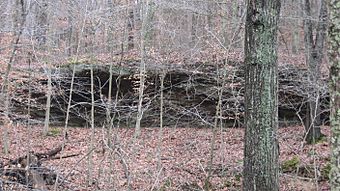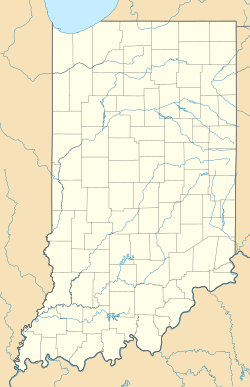Potts Creek Rockshelter facts for kids
Quick facts for kids |
|
|
Potts Creek Rockshelter Archeological Site (12CR110)
|
|

Roadside view of the shelter
|
|
| Location | Southern side of State Road 62, 1.25 miles (2.01 km) east of St. Croix |
|---|---|
| Nearest city | St. Croix, Indiana |
| Area | 0.1 acres (0.040 ha) |
| NRHP reference No. | 86003174 |
| Added to NRHP | February 4, 1987 |
The Potts Creek Rockshelter Archeological Site is a fascinating historical spot located in the Hoosier National Forest in Crawford County, Indiana. A rockshelter is like a natural cave or overhang in a rock formation. For thousands of years, this particular rockshelter was a temporary home or camp for different groups of Native Americans.
Today, no one lives in the rockshelter. It is protected and studied by archaeologists. In 1987, it was added to the National Register of Historic Places. This means it's recognized as an important place in American history.
Contents
What is the Potts Creek Rockshelter?
The Potts Creek Rockshelter is a natural rock overhang. It offered shelter from the weather, making it a good place for ancient people to set up camp. It's found on the southern side of Indiana State Road 62, not far from the town of St. Croix.
Archaeologists have found clues at the site that tell us about the people who once used it. These clues include tools, leftover food, and other items. They help us understand how ancient people lived in this area.
Who Lived Here Long Ago?
The Potts Creek Rockshelter was used by Native Americans during three main time periods. These periods span thousands of years, showing how long people have lived in North America.
Paleo-Indian Period
The earliest people to use the rockshelter were from the Paleo-Indian period. This was a very long time ago, roughly from 10,000 to 8,000 BC. These early groups were hunters and gatherers. They moved around a lot, following large animals like mammoths and mastodons. They likely used the rockshelter as a short-term camp while hunting or traveling.
Archaic Period
Next came the people of the Archaic period, from about 8,000 to 1,000 BC. During this time, the climate became warmer and drier. People started to rely more on smaller animals and a wider variety of plants. They also developed better tools for hunting and processing food. The rockshelter would have been a convenient base for these activities.
Woodland Period
The last major group to use the site was from the Woodland period, from about 1,000 BC to 1,000 AD. This period saw big changes, like the development of pottery and the beginning of farming. People started living in more settled villages, but they still used places like the rockshelter for hunting trips or seasonal camps.
Why is This Place Important?
The Potts Creek Rockshelter is important because it helps us learn about the lives of ancient people in Indiana. Each layer of soil and artifacts at the site tells a story. By studying these clues, archaeologists can piece together how different groups adapted to their environment over thousands of years.
Being on the National Register of Historic Places means the site is protected. This helps make sure that future generations can also learn from this special place. It's a window into the past, showing us the rich history of Native Americans in the region.



